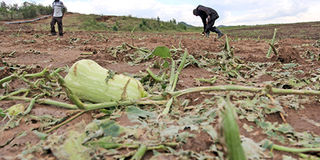Insuring more smallholder farmers will boost food security

Farmers check on damage wreaked by heavy rains on a farm in Kisumu. Because of the large variety of constraints that smallholders face, agriculture insurance will be more efficient when embedded in a comprehensive value chain strategy. PHOTO | FILE | NATION MEDIA GROUP
What you need to know:
- Many of these constraints are beyond the farmers’ control as they depend on environmental conditions, policies or market players.
- Value chains work best when all the elements cooperate to produce higher-quality products and generate more income for all participants along the chain.
- Kenya has become one of Africa’s pioneers in developing an agriculture insurance market to protect smallholders and pastoralists against the risks of the unpredictable and changing climate.
- The success of most insurance projects lies in the combination of insurance with other services, such as loans, in-kind seed pay-outs and government programmes that improve soil conditions and infrastructure.
Agriculture is the main source of income for many rural communities in Kenya and is essential for food production.
Life for rural smallholder farmers is often marred by difficulties. There are many constraints limiting their economic potential.
Challenges include restricted access to capital, farm inputs such as fertiliser or seeds and other inputs, unfavourable prices, trade policies and climate change, which includes the increasing frequencies of flooding, droughts and pests such as locusts and armyworms.
Many of these constraints are beyond the farmers’ control as they depend on environmental conditions, policies or market players.
However, it is essential that the private and public sectors come together to increase their role in the value chain to enable the smallholder to become a better and successful farmer.
A value chain encompasses the flow of products, knowledge and information, finance, payments and the social capital needed to organise producers and communities.
Value chains work best when all the elements cooperate to produce higher-quality products and generate more income for all participants along the chain.
Information is especially important to all value chain individuals and flows in two directions: markets inform producers of price, quantity and quality needs, product handling and technology options, while producers inform processors and markets on production quantities, locations, timing and production issues.
Agricultural insurance has the potential to add immense value to the chain by facilitating access to means of production and changing behaviour by reducing uncertainty.
Coverage can enable farmers to invest in riskier but potentially more lucrative farm activities. Timely insurance payouts after crop and livestock losses can help smallholders’ smooth consumption and prevent the sale of assets.
Insurance can also be a catalyst, as lenders will be more likely to extend credit to farmers covered, allowing them to make productivity-enhancing investments.
IMPART MORE RESILIENCE
Research has shown, over the past few years in Kenya, that insurance spurs the adoption of better farm management practices and new technology, which contributes to reducing disease risks and thus boosts creditworthiness of farmers.
Another impact is that it enables farmers to become better organised and participate actively in risk management programmes in a more cost-effective manner.
These benefits from insurance enhance the adaptive capacities of small-scale farmers to changes and impart more resilience on the overall value chain.
Partnership is essential between government, insurers, farmer groups and other value chain players. As such, a well-designed insurance programme lightens the government’s burden of disaster recovery and rehabilitation efforts.
The government has made it part of its climate-change adaptation strategy and uses insurance as a policy instrument for social protection of small, resource-poor farmers.
Kenya has become one of Africa’s pioneers in developing an agriculture insurance market to protect smallholders and pastoralists against the risks of the unpredictable and changing climate.
The country’s first index-based agriculture insurance pilot took place in 2008. Since then, the government, in conjunction with the private sector and development institutions, have been collaborating and experimenting to develop and expand the market.
However, demand is still low as many smallholder farmers underestimate the severity and frequency of risk, levels of consumer education are still limited, there is a lack of trust in insurance providers and there is an overreliance on traditional coping mechanisms such as selling assets or borrowing from relatives after a shock.
This low demand makes the provision of sustainable agricultural micro-insurance challenging, particularly when offering insurance as a stand-alone.
The success of most insurance projects lies in the combination of insurance with other services, such as loans, in-kind seed payouts and government programmes that improve soil conditions and infrastructure.
Because of the variety of constraints smallholders face, insurance will be more efficient when embedded in a comprehensive value chain strategy.
The writer is the CEO of Apollo Group and director APA Insurance.

